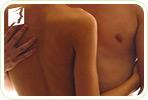Treatments for low libido are as varied as the women who seek them. Many menopausal women report low libido levels and look for an effective remedy to treat this challenging menopause symptom. Treatments for low libido can help maintain a fulfilling sex life for years.
What Causes Low Libido in Women?
Women experience low libido for a number of physical and psychological reasons.

Hormonal fluctuations that occur during physical transitions such as pregnancy and menopause often lead to low libido. Imbalanced hormones can also cause vaginal dryness, which leads to painful sex, another reason that your libido may decrease. Some types of medications also have low libido as a symptom because they change hormone levels.
There are also some psychological causes for low libido. Stress, fatigue, and depression can all lead to low libido. This is because of a variety of factors, but essentially it comes down to the brain isn't producing the right chemicals to stimulate sexual desire. Getting enough sleep, and finding treatments for stress and depression usually restore libido.
Approaches to Treating Low Libido
There are a number of ways to treat low libido, including:
Lifestyle changes
Incorporating a few lifestyle changes into the usual routine is the easiest and safest remedy for low libido. These lifestyle changes target many of the causes of low libido and might be all that is needed to regain a fulfilling sex life. Some of these lifestyle changes include:

- Exercising regularly
- Eating healthy foods that boost estrogen levels (e.g., soy, apples, wheat)
- Counseling or sex therapy
- Practicing stress reduction techniques (e,g., yoga and meditation)
- More foreplay before sex
Alternative medicine
If lifestyle changes are insufficient, alternative medicine can be effective. There are two types of herbal supplements: phytoestrogenic and hormone-regulating.
- Phytoestrogenic supplements. These supplements help balance hormone levels and decrease low libido. Although effective, long term, they can lead to a decrease in the amount of estrogen produced in the body and a dependency on the herbs.
- Hormone-regulating supplements. Rather than introducing hormones into a woman's body, these supplements stimulate the body to produce more of its naturally-occurring hormones.
Medications
Prescribed medications for increasing libido in women involve the introduction of synthetic hormones to help balance overall hormone levels. Treatments like hormone replacement therapy (HRT) are common in severe cases of menopausal symptoms. This will depend on medical history and what your doctor thinks is best.
More Information
Many have found that one of the best remedies for low libido is a combination of lifestyle changes and alternative medicines. For more information, click on the links below.
Sources
- Studd, John. "Loss of Libido and Menopause". The Management of Menopause. Annual Review 1998. Partenon Publishing.
- Channon L.D and Ballinger S.E. "Some Aspects of Sexuality and Vaginal Symptoms during Menopause and their Relation to Anxiety and Depression". British Journal of Medical Psychology. June 1986. 59 (2): 173-80.
- Sarell, Philip, M.D. "Psychosexual effects of menopause: Role of androgens". American Journal of Obstetrics & Gynecology. March 1999. 180: 3S-II.


